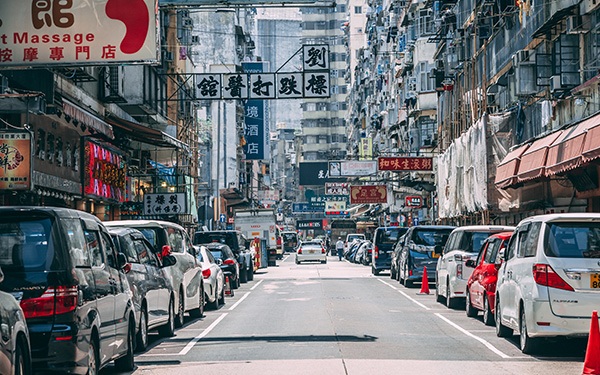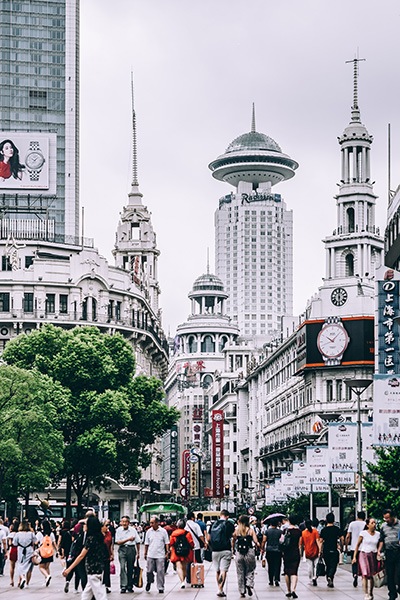Considering moving to China from the UK?
The third biggest country in the world, China is a country that’s going places. At the forefront of industry and technology and strikingly modern, China is also a land steeped in rich and ancient culture and traditions. This is the world’s oldest civilisation, with some of the most stunning scenery in the world, plus some of the most delicious cuisine.
This, combined with endless opportunities for adventure, a diverse and friendly population, and the low cost of living are just some of the things that attract expats from all over the world to live in China.
Here’s our guide to the most important things you need to know if you’re thinking of making a move to China from the UK…
Contents
China Visa Requirements for Brits
China is a communist country famous for its bureaucracy and endless red tape.
It is advisable to arrive equipped with as much documentation as possible and with more than the minimum requirement of 6 months left to run on passports.
Visa rules and regulations have undergone numerous changes in recent years, and may change without much advance warning.
Here’s how things currently stand with China visa requirements for Brits…
Visiting
To acquire a visitor visa — known as an ‘L’ visa — you will need to provide a copy of your passport, full travel itinerary or an invitation letter from a Chinese citizen, proof that you have sufficient funds for the duration of your visit, a completed visa application form with colour photo, and evidence of onward travel.
L visas are valid for 90 days and can be obtained from Chinese embassies, consulates, Chinese diplomatic missions, or a Chinese Visa Application Centre.
Processing the visa application normally takes around 4 days, and costs £151.
Working
A work or ‘Z’ visa is issued to foreigners intending to stay and work in China for periods longer than 3 months.
The visa itself only covers a stay of 30 days, during which time you must go through the process of getting a temporary residence permit with the aid of your employer, which will extend your work visa for up to 5 years depending on the length of your work contract.
Close family members can enter also China with this visa.
To apply for a work visa you will need a copy of your passport, a completed China work visa application form with recent photo, plus a work permit obtained from your Chinese employer.
As with the visitor visa, processing the visa application normally takes around 4 days, and costs £151.
Permanent Residency
China’s green card is a permanent residency permit which can be notoriously tricky for foreigners to obtain.
In order to get one you will need to be either married to a Chinese citizen and living with them in China for at least 5 years, or have made stable and significant investment in China for three years in a row plus a sound taxation record.
Alternatively, you must have been employed in a high level post such as deputy general manager, deputy director, academic professor or researcher for more than four years in a row, along with a solid tax record, or make a major contribution to China, or possess a skill specially needed by China.
If you fulfil one of these criteria, you can apply for permanent residency with your passport and completed application form plus the relevant documentation which may include things such as health certificate, proof of financial investment, employment record, proof of marriage or household registration.
Once obtained, your Chinese green card will entitle you to enter and exit China without a visa for a period of either 5 or 10 years.
Way of Life in China
Lifestyle

China boasts a strong and vibrant culture and a booming economy, and offers expats an exciting and culturally rich lifestyle — but one with aspects that some foreigners may find challenging.
British expats living in China benefit from high wages and a low cost of living, but Chinese cities (where the vast majority of expats reside) are huge, densely populated, polluted, and chaotic, which can be a little overwhelming for some.
That said, expat communities in the cities are friendly, active and thriving, offering up the possibility for a lively social life.
Chinese cities are pretty cosmopolitan, with a wide range of entertainments, regular sporting events, excellent nightlife and a buzzing music scene, and fantastic restaurants.
Away from the cities, China’s spectacular and diverse geography provides endless natural landscapes to explore, from the flaming mountains of the north east, to the waterfalls, glaciers, forests and rivers of Sichuan Province, and the complex geological structures and mysterious misty landforms of Zhangjiajie National Forest Park or the dramatic wide gorges of Yangtze River.
.
China is a communist country, with a high level of government presence in the lives of its citizens, and with internet, TV and other media being strictly censored so as not to expose people to ‘harmful’ content, and for some expats this can take some getting used to, as well as occasionally causing issues with communicating with friends and family back home. Just try accessing Facebook for starters…
The Chinese people remain highly family orientated as well as being generally welcoming to foreigners.
Food is a massive part of Chinese culture, and the Chinese spend hours lingering in restaurants and bars, chatting and eating delicious local cuisine.
As well as excellent Chinese restaurants, big cities have an abundance of western fast food joints and restaurants, so you don’t have to compromise on your favourite comfort foods.
English is not widely spoken, and it is critical to learn some Mandarin if you want to benefit from everything life in China has to offer.
Take a look at this video for some good practical tips on laying down roots in China:
Getting Around
If you need to travel long distance within this immense country, air travel is your best option. Thanks to China’s rapid growth in recent decades, there is an extensive and continually expanding air network in place, and domestic flights are good value, although delays are common.
Along with travelling by plane, China’s comprehensive rail network is an excellent way to get around — it’s fast, efficient, and dependable. Ticket prices are reasonable, and there are plenty of high speed time saving options available. Trains are comfortable and sleeper trains are a good option for longer journeys.
Buses are another good option, and allow access to certain areas of the country which can’t be reached by train. Most buses are comfortably equipped, with toilets and sleeper bunks on long distance routes, with tickets costing even less than train tickets.
When travelling around locally, most cities have a speedy metro or light rail system, or a slower city bus system.
Both services are inexpensive and operate from early in the morning to around 10 pm. However like most city public transport networks, these services can be packed with passengers — particularly at peak times. T
axis are also a good way to get around town, as they are easy to find and prices are low. If you’re feeling fit, travel by bicycle is another good option.
It’s easy to rent a bike by the day or by the hour from train stations or youth hostels in Chinese cities, and this mode of transport also gives you the freedom to explore the surrounded countryside outside of the city.

Driving in China
Driving around China can be hazardous to say the least, and most expats choose to rely on other modes of transport to get around.
Chinese drivers have a tendency to ignore the rules of the road, and there is a high accident and fatality rate. Cities experience frequent gridlock, making getting from A to B a slow and trying experience.
In addition to this, road signs are most often written in the Chinese language or characters, making them unintelligible if you’re not at ease with the native tongue.
Hiring a car is a complicated business for expats in China, and is currently only possible in the cities of Beijing and Shanghai, and can be costly.
If you do manage to get your hands on a set of wheels, you’ll need to have a residence permit and temporary driving license in order to use them, as international driving licenses are not sufficient.
These can be obtained from the Department of Motor Vehicle Administration and last for a duration of 3 months. If you want to continue driving for any longer than this you will have to apply for an official Chinese driving license.
Weather in China
As you would imagine in such a huge country, the weather in China varies greatly between regions.
Eastern and southern areas experience a tropical monsoon climate, with hot, humid summers with temperatures of over 30 degrees Celsius, cool winters, and plenty of storms during the rainy season.
In contrast, the north eastern parts of the country see hot, dry summers and icy winters with temperatures as low as -20 degrees Celsius.
Southern, western, and central China are susceptible to serious flooding, as well as earthquakes. In general though, most of China has a climate with cold and dry winters, and hot, wet summers.
Cost of Living in China
Lifestyle
The cost of day to day living in China will vary depending on where you choose to make your home — like elsewhere in the world, living in the city is more expensive than living in rural areas — although generally the cost of local goods including fresh foods, clothes, electrical items, and entertainment is low.
That said, if you want to continue your western lifestyle whilst living here, you need to be prepared to pay, as western goods are imported, and therefore more costly than back in the UK.

Eating out is a big part of Chinese culture, and eating in restaurants is an affordable option.
Bars charge prices similar to those in Britain.
Rent
If you’re living and working in China it’s best to negotiate a housing allowance with your employer to cover your accommodation costs, as rental prices can be high — particularly in central city areas.
The cost of a decent, furnished 2 bedroom apartment in the city will set you back anywhere between 4,500 and 13,000 RMB per month (equivalent to between around £500 and £1450 per month).
Utility prices are very affordable, averaging out at around 300 RMB or £35 per month for a 2 bed apartment.
Healthcare
There are a number of healthcare options in China, from public hospitals to international hospitals and private clinics.
The cost and quality of public medical care varies dramatically throughout the country, and the public health care system is largely considered substandard, although some large public hospitals in major cities do offer medical care on a par with the western standard – at an additional cost.
Most expats choose to opt for private healthcare which offers a high standard of medical treatment, however this does cost at least double what you pay at a public hospital.
Thankfully many employers offer private healthcare insurance as part of their employment package, but if you aren’t able to benefit from such a deal, you’re best bet is to take out your own private healthcare policy.
There are various plans available depending on your age and physical fitness, but you can expect to pay anywhere between 5500 RMB and 20,000 RMB (around £600 to £2250) for a basic annual policy.

Schooling
The Chinese people place huge importance on education as part of their culture, and as a result the Chinese education system is one of the most highly regarded in the world.
Chinese public and private schools have gruelling schooling techniques, and teach only in Chinese. There are excellent international schools in the big cities — notably in Beijing and Shanghai — but waiting lists can be lengthy and application processes tough.
Fees for these highly reputable schools are extremely high, often costing more than £25,000 a year, although these costs are sometimes partially covered as part of an employment contract.
An alternative option for children of expats living in China is home schooling. Although this is frowned upon by the government, this is fast becoming a popular way for expat parents to avoid the exorbitant costs and long waiting lists of international schools, and some expat parents are even starting up their own pre-schools.
Popular Areas for Brits
Hong Kong
Boasting some of the world’s finest cuisine, Hong Kong is sure to put a spell on you with it’s glittering high rise skyline, characterful neighbourhoods, splendid harbour, cutting edge culture, and unsurpassed shopping venues.
It’s also more Western friendly than much of mainland China, being as it was a British colony not that long ago, and so promises to be less of a culture shock.

Expect ‘little green man’ road crosses, red double decker buses and even branches of M&S.
Because of its history, its people have a more clearly defined independent spirit and individualism than those on the Mainland.
Beijing
The capital and cultural heart of the People’s Republic of China, beautiful Beijing effortlessly mixes it’s extraordinary history with the contemporary.
The exotic lure of the mysterious Forbidden City combines with innovative modern architecture, incredible museums, galleries, and performing arts, and sublime restaurants.
Shanghai
Glamorous Shanghai sits seductively astride the Huangpu River, lining its shores with sparkling skyscrapers.
This is a exciting city bursting with designer boutiques, mouth watering restaurants, chic bars and clubs, and elegant culture, but with colonial roots that can still be seen in the twisting narrow back streets and traditional markets.

Shenzhen
The ultimate symbol of China’s phenomenal recent economic growth, Shenzhen is a city transformed into a dynamic metropolis where business is booming.
Electrifying nightlife, gourmet cuisine, lush parks and beaches, shopping opportunities to rival Hong Kong, charming urban villages, and much more awaits expats in Shenzhen.
Sometimes described as China’s own Silicon Valley, Shenzhen is the place to come if you’re looking for software engineering work.
Guangzhou
Stroll along Guangzhou’s pleasant leafy streets and enjoy the delightful colonial architecture, dive into an authentic eatery for a dim sum banquet, and visit ancient mosques and temples, or head over to New Town for vibrant nightlife, a trip to the opera, or take a cruise on the magnificent Pearl River.
Chengdu
Famed for its giant Pandas, Chengdu is a city with a diverse culture popular with expats from all over the globe who come for the laid back vibe, spicy Sichuan cuisine, quaint teahouse culture, numerous scenic spots, and lively nightlife.

Jobs in China for British Expats
Job prospects for expats in China are generally good.
Speaking Mandarin can be a huge boon as the best-paying jobs in China generally require the ability to speak the language, but even English-only speakers can find well paid work with one of the myriad multinational companies operating in big cities such as Beijing and Shanghai, Hong Kong, Guangzhou, Shenzhen and Tianjin.
Wherever possible it is strongly advised to secure employment before arriving in China due to visa requirements.
Teaching jobs abound for expats looking to move to this progressive country, or alternatively Brits with skills in high demand sectors such as advertising, IT, engineering, marketing and sales, finance and banking, manufacturing, technology, and tourism stand a strong chance of finding a suitable position — the more highly skilled you are, the more likely it is that you will get hired.
That’s everything you need to know about moving to China from the UK — are you tempted to make the move?





